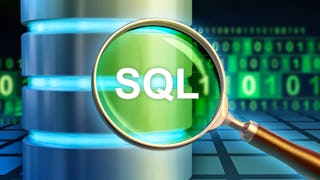Are you ready to dive into the world of data engineering? In this beginner level course, you will gain a solid understanding of how data is stored, processed, and accessed in relational databases (RDBMSes). You will work with different types of databases that are appropriate for various data processing requirements.

Enjoy unlimited growth with a year of Coursera Plus for $199 (regularly $399). Save now.

Introduction to Relational Databases (RDBMS)
This course is part of multiple programs.


Instructors: Rav Ahuja
91,027 already enrolled
Included with
(760 reviews)
Recommended experience
What you'll learn
Describe data, databases, relational databases, and cloud databases.
Describe information and data models, relational databases, and relational model concepts (including schemas and tables).
Explain an Entity Relationship Diagram and design a relational database for a specific use case.
Develop a working knowledge of popular DBMSes including MySQL, PostgreSQL, and IBM DB2
Skills you'll gain
Details to know

Add to your LinkedIn profile
See how employees at top companies are mastering in-demand skills

Build your subject-matter expertise
- Learn new concepts from industry experts
- Gain a foundational understanding of a subject or tool
- Develop job-relevant skills with hands-on projects
- Earn a shareable career certificate

There are 4 modules in this course
In this module, you will first learn about the fundamental aspects of data structures and file formats, along with the differences between relational and non-relational databases. You’ll explore various types of data models and discuss fundamental concepts in database management. Additionally, you’ll explore Entity-Relationship Diagrams (ERD) along with their components and relationships. You will also gain expertise in diverse database topics. Finally, you’ll gain a clear understanding of Db2 and PostgreSQL.
What's included
14 videos3 readings4 assignments4 plugins
In this module, you’ll explore the types of SQL statements, like Data Definition Language (DDL) and Data Manipulation Language (DML). You’ll learn how to create, modify, and manage tables using DDL statements and understand data movement utilities for efficient data loading and management. Additionally, you’ll dive into key database objects such as schemas, primary keys, foreign keys, and indexes, gaining insights into their roles in data organization, integrity, and retrieval. You’ll also understand the importance of normalization for reducing redundancy and ensuring data consistency, while also understanding various constraints within the relational model to maintain data accuracy and reliability.
What's included
11 videos2 readings4 assignments3 app items4 plugins
In this module, you will learn about the fundamental aspects of MySQL and PostgreSQL and identify Relational Database Management System (RDBMS) tools. You will explore the process of creating databases and tables and the definition of keys, constraints, and connections in MySQL. Additionally, you will discover important processes in PostgreSQL using command line, pgAdmin, and views. Moreover, you will gain essential skills such as database loading techniques and insights into securing sensitive data and streamlining data retrieval.
What's included
7 videos2 readings4 assignments6 app items
In this module, you will navigate the database design process, refine your practical skills, and understand essential steps. You will discover the role of Entity Relationship Diagrams (ERDs) and get an opportunity to engage in a hands-on database design lab, where you will use your theoretical knowledge to create databases. As you progress, you will receive an optional final assignment and project submission stages. For those seeking an advanced challenge, a final project using Db2 is available. A glossary is available for quick reference to key terms used throughout the module.
What's included
1 video2 readings1 assignment1 peer review2 app items3 plugins
Earn a career certificate
Add this credential to your LinkedIn profile, resume, or CV. Share it on social media and in your performance review.
Explore more from Data Management
 Status: Free Trial
Status: Free TrialIllinois Tech
 Status: Free Trial
Status: Free Trial Status: Free Trial
Status: Free Trial Status: Free Trial
Status: Free Trial
Why people choose Coursera for their career




Learner reviews
760 reviews
- 5 stars
74.37%
- 4 stars
17.21%
- 3 stars
3.81%
- 2 stars
1.83%
- 1 star
2.75%
Showing 3 of 760
Reviewed on Dec 31, 2022
It was good for an introduction to relational databases and learning the basic usage of the tools for managing databases
Reviewed on Aug 29, 2023
This is best course I have came across . very good content . Easy to understand and more practical.
Reviewed on Mar 17, 2024
Great course that sums up all that it teaches at the end, unfortunately I encountered an error loading PostgreSQL and MySQL at the end on the cloud IBM platform so I did it in VisCode

Open new doors with Coursera Plus
Unlimited access to 10,000+ world-class courses, hands-on projects, and job-ready certificate programs - all included in your subscription
Advance your career with an online degree
Earn a degree from world-class universities - 100% online
Join over 3,400 global companies that choose Coursera for Business
Upskill your employees to excel in the digital economy
Frequently asked questions
To access the course materials, assignments and to earn a Certificate, you will need to purchase the Certificate experience when you enroll in a course. You can try a Free Trial instead, or apply for Financial Aid. The course may offer 'Full Course, No Certificate' instead. This option lets you see all course materials, submit required assessments, and get a final grade. This also means that you will not be able to purchase a Certificate experience.
When you enroll in the course, you get access to all of the courses in the Certificate, and you earn a certificate when you complete the work. Your electronic Certificate will be added to your Accomplishments page - from there, you can print your Certificate or add it to your LinkedIn profile.
More questions
Financial aid available,
¹ Some assignments in this course are AI-graded. For these assignments, your data will be used in accordance with Coursera's Privacy Notice.

